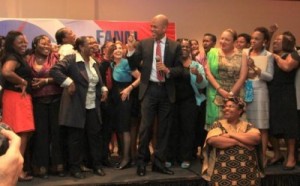A BLOG POST BY STEPHENIE FOSTER I just returned from Haiti, where I was working with women convened by the Haitian group Femmes en Democratie to develop a women’s policy platform. In Creole, nap vanse means we advance, and it is critical that Haitians move forward together to build a stronger country and a stronger economy.
I just returned from Haiti, where I was working with women convened by the Haitian group Femmes en Democratie to develop a women’s policy platform. In Creole, nap vanse means we advance, and it is critical that Haitians move forward together to build a stronger country and a stronger economy.
The priorities identified can help both women and men prosper, but women’s participation in Haiti’s political, economic, and social institutions is critical. Women comprise 52% of Haiti’s population, and approximately 44% of households are led by women. Like every country, Haiti cannot make economic and social progress if it leaves half of its people behind and if it fails to tap the diverse experiences, talents and vision of its women.
All Haitians were affected by the 2010 earthquake, but women were hit especially hard. Haitian women were left to pick up the pieces with limited internal resources. Despite that, women remain outside of the formal decision-making sphere at all levels. Presently, women comprise less than 3% of the nation’s Parliament and their voices have largely been left out of the reconstruction efforts. While the constitution was amended in 2011 to include a 30% quota for women in national life, that quota has not been implemented.
The platform that was developed is a blueprint for action — by the Haitian government, international partners, the business community, political parties and candidates for public office — to address the needs of all Haitians. It is based on input from 315 focus groups with more than 3,200 women and men from rural and urban communities in Haiti, from all walks of life and income levels. The process highlighted the real needs, hopes and dreams of Haitian women and men for the future of their country, and the importance of women in that future. Importantly, 47% of the participants were men and 53% were women.
The platform identified common priority issues and concrete policy proposals to (1) increase economic and education opportunities for women and their communities, (2) ensure that adequate infrastructure and environment exists for development; (3) improve access to health care and address gender based violence and (4) increase women’s political and civic participation.
Underpinning the platform is a focus on strengthening the role and effective involvement of women in all sectors of society. At the same time, the platform recognizes that investing in women and ensuring women’s full economic, political, and social participation builds a stronger, more stable society, which creates a foundation for increased investment in Haiti and a path to sustainable growth.
These economic policies span strengthening Haiti’s agricultural sector by establishing farming and fishing cooperatives run by women, to ensuring greater access to credit with reasonable requirements and low interest rates. Infrastructure is critically important and the women focused on the need for primary and secondary public schools, roads and community health centers and hospitals, as well as ensuring widespread access to potable water and electricity.
Health and gender based violence were addressed by concrete policies to establish community health centers and hospitals, fund activities to combat gender based violence and increase legal assistance for victims of gender based violence. The priorities for increasing women’s political and civic participation were to establish technical and financial support for women running for political office as well as to ensure the passage and implementation of the 30% quota for all levels of government and decision making positions.
This was an exciting time to be in Haiti, and the interconnected policies set out by these Haitian women and men are fundamental to a Haiti that can truly advance.
Stephenie Foster is a Professorial Lecturer at the Women & Politics Institute at American University and an international advocate for women’s empowerment. She has participated in numerous international programs and projects sponsored by the United States State Department, the Vital Voices Global Partnership, the National Democratic Institute for International Affairs (NDI), the International Foundation for Election Systems (IFES) and others, and is currently a member of the board of directors of Women Thrive Worldwide, Partners for Democratic Change and the Sewall-Belmont House & Museum.
